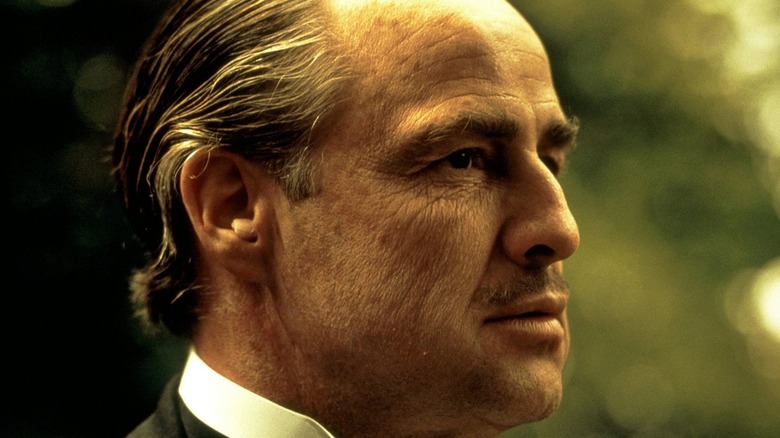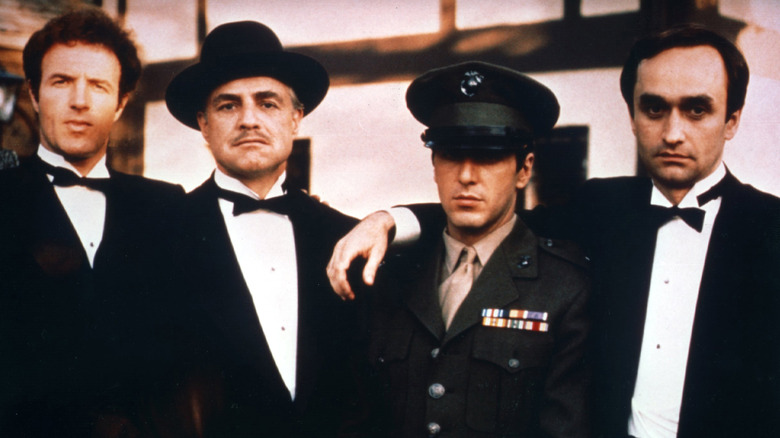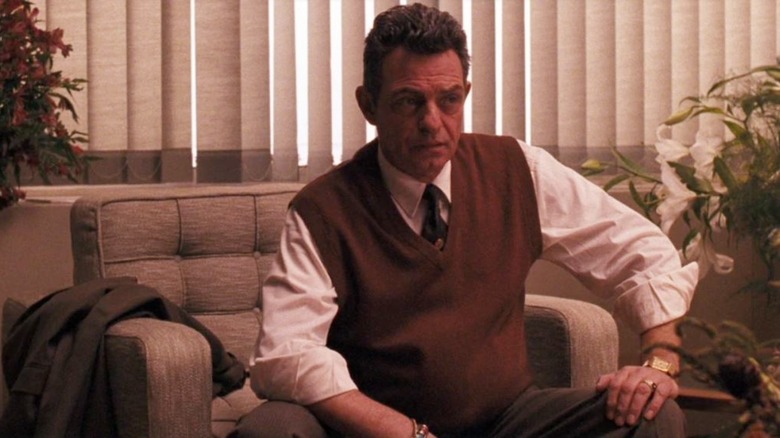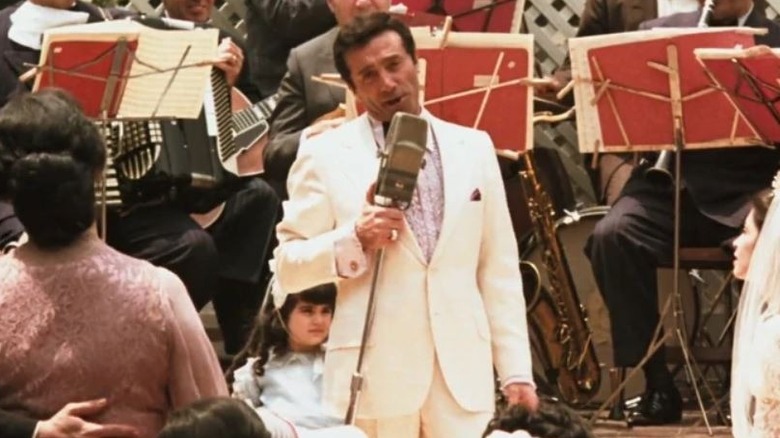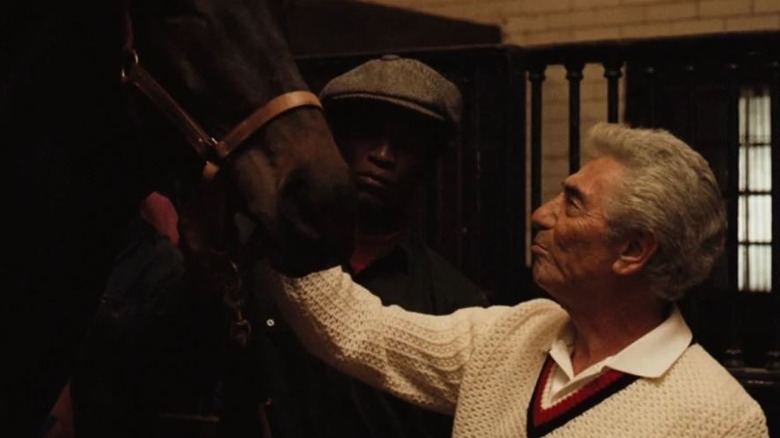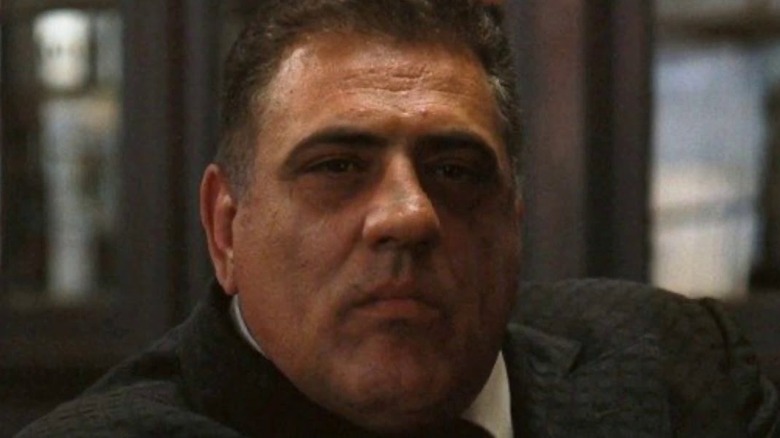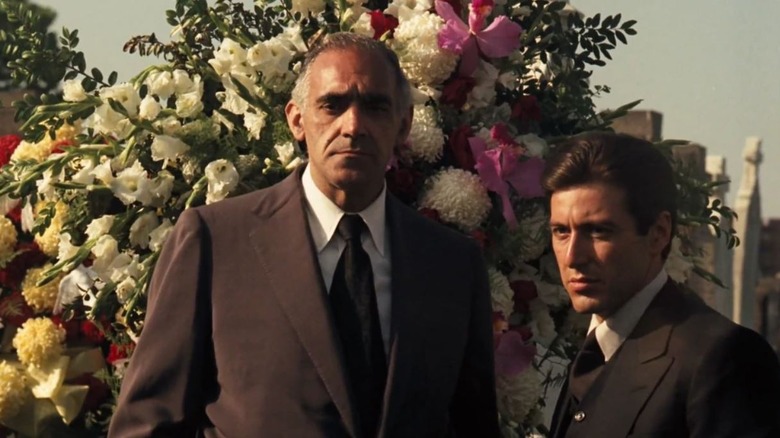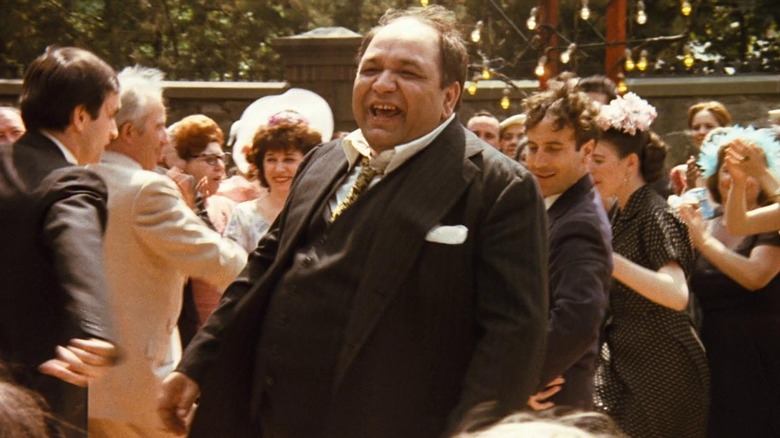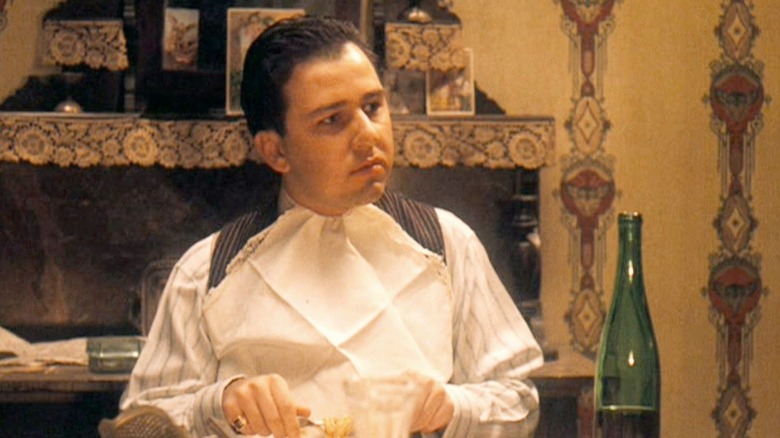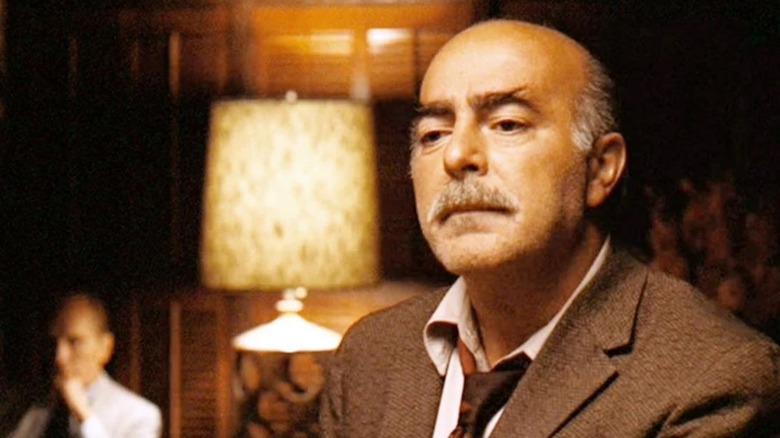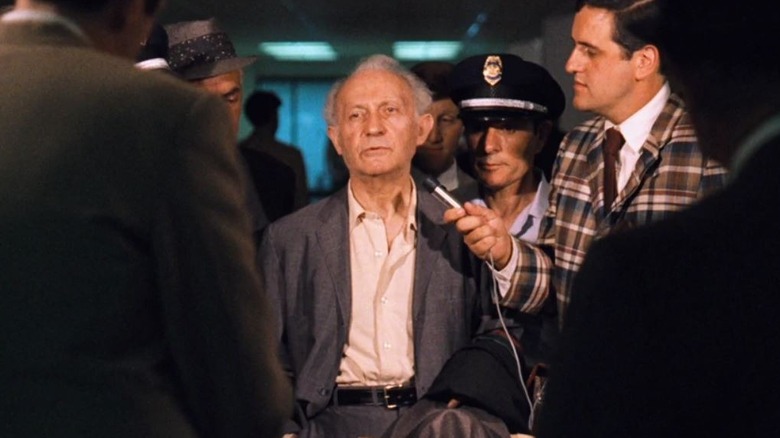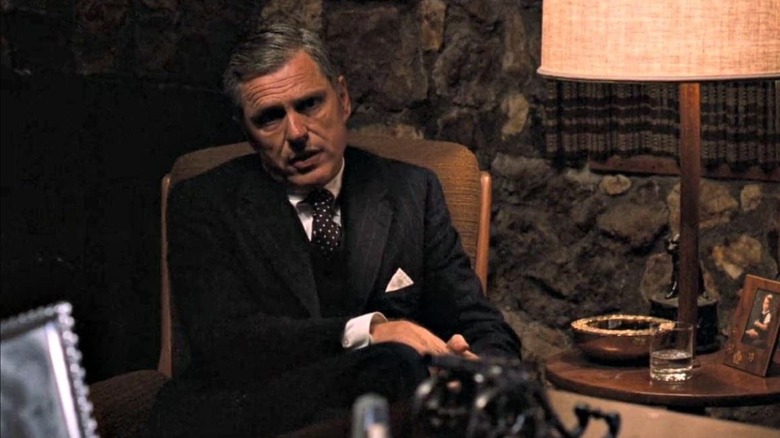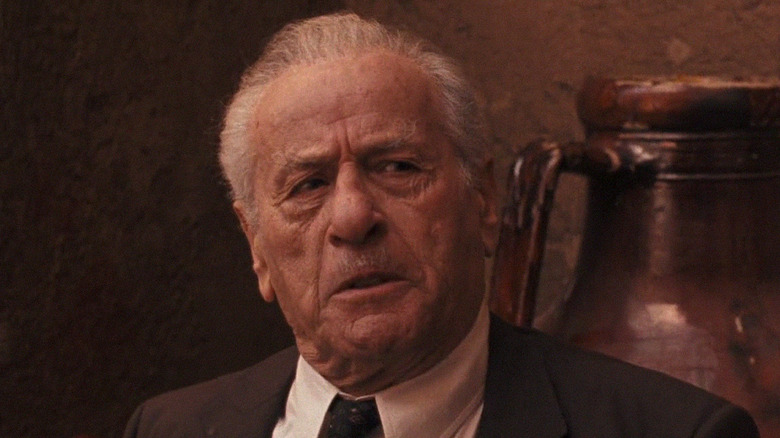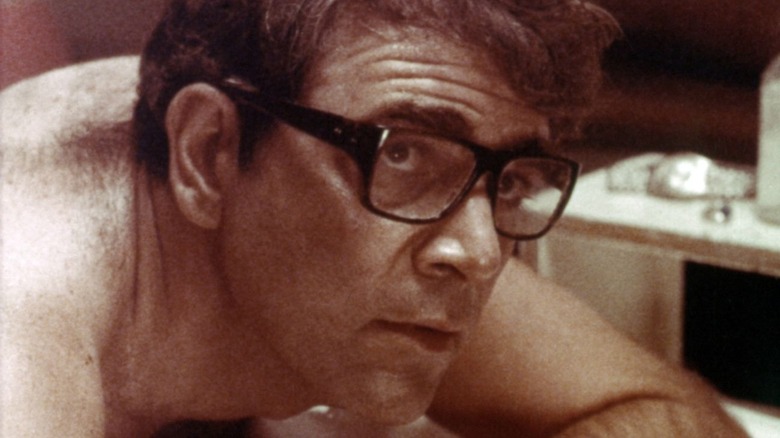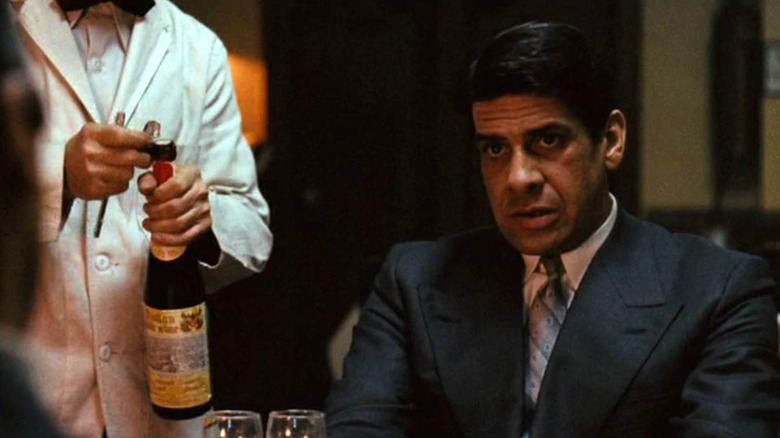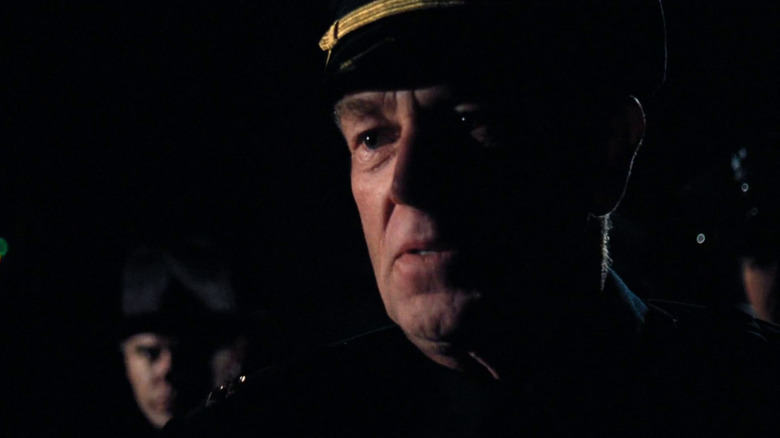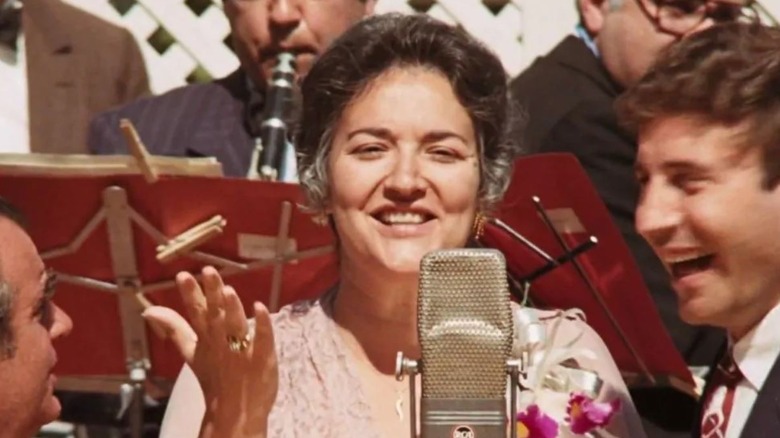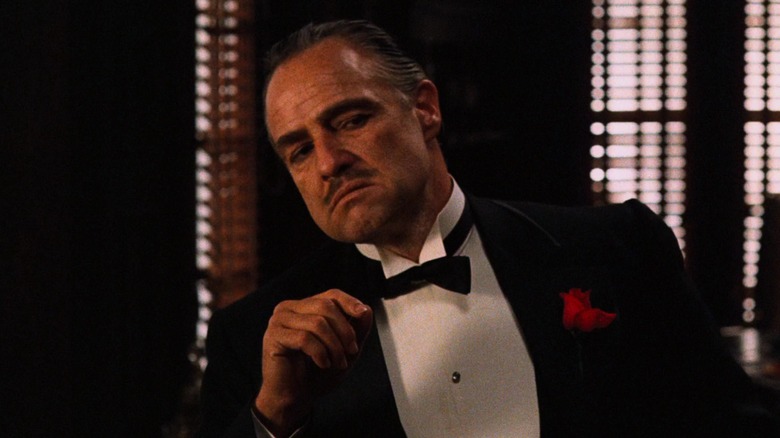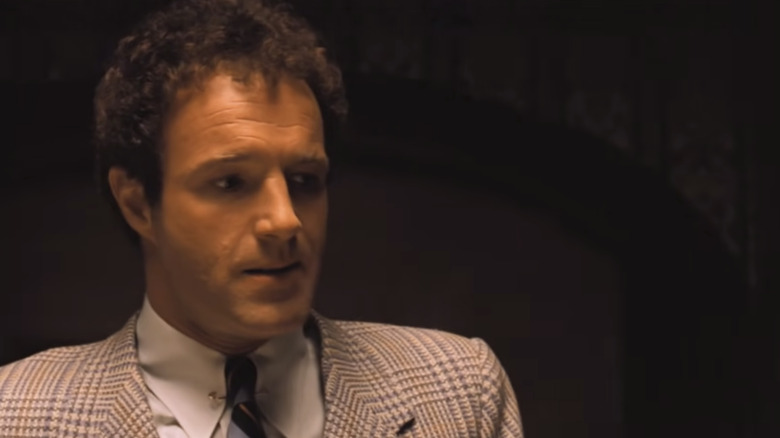The Godfather Actors You May Not Know Passed Away
Many fans, film critics, scholars and industry organizations consider 1972's "The Godfather" to be one of the greatest films ever made, a consensus that was solidified with 11 Oscar nominations and wins for Best Picture, Best Actor for Marlon Brando, and Best Adapted Screenplay for Francis Ford Coppola and Mario Puzo. Even more amazing, the film's 1974 sequel, "The Godfather: Part II," also nabbed 11 nominations (with six wins including Best Picture and Best Director for Coppola), while the final film in the trilogy in 1990 earned an additional seven Oscar nods.
While Coppola's brilliant direction provided a solid foundation for "The Godfather" trilogy, along with his and Puzo's compelling scripts about a New York crime family struggling to go legitimate, there is no question that the venerable cast of the sprawling saga played a large part in making the films the classics that they remain today.
Since the first film's release nearly 50 years ago, "The Godfather" and its sequels have sadly lost a number of cast members from leading to supporting roles. No matter their amount of screen time, all of the characters these actors played are legendary for their contributions to the whole and should be honored as such. Here is a look at "The Godfather" actors you didn't know passed away.
Every film in John Cazale's short career had a connection to The Godfather
Primarily a stage actor for most of his adult life, John Cazale's film career did not break out until 1972 when Francis Ford Coppola cast him as Fredo Corleone, the doomed middle son of the Corleone family. While Cazale was predominantly known for his heartbreaking performance of the docile Fredo — who is tragically assassinated on the order of his younger brother, Michael (Al Pacino), after betraying the family in "The Godfather Part II" — he also left huge impressions on the three other films he starred in before his untimely death in the late 1970s.
Perhaps the most interesting thing about Cazale's films apart from "The Godfather" and its first sequel is that each of the three projects had a major connection to the "The Godfather" films. Cazale's film between the Oscar-winning mob classics, 1974's "The Conversation," was also directed by Coppola, while the 1975 crime drama "Dog Day Afternoon" reunited Cazale with Pacino. In his final screen role in 1978's Best Picture Oscar winner "The Deer Hunter," Cazale starred opposite Robert De Niro, who embodied the young Vito Corleone in "The Godfather Part II."
Sadly, Cazale's 11-year battle with lung cancer ended on March 13, 1978, with his then-girlfriend, "Deer Hunter" co-star Meryl Streep, by his side. Aware of his terminal illness during the production, director Michael Cimino reportedly rearranged the shooting order of the film so Cazale could complete his scenes. Unfortunately, Cazale never got the opportunity to celebrate the release of "The Deer Hunter," which premiered in Los Angeles in December of 1978, nine months after his death at 42.
Richard Bright appeared in all three Godfather films
Unlike many of the characters who played the muscle protecting the family in "The Godfather" trilogy, Richard Bright survived through it all as Al Neri, a longtime Corleone family bodyguard. Bright had a prolific career that mostly consisted of guest spots from 1957 to 1971, until he landed the role of his career in 1972 as Neri in "The Godfather."
Apart from reprising Neri in 1974's "The Godfather Part II" and 1990's "The Godfather Part III," the steely-eyed actor alternated between bad guy and good guy roles in films like "Once Upon a Time in America" and "Red Heat," plus television series including "Oz," "The Sopranos," "Law & Order" and "Law & Order: Criminal Intent."
Bright tragically died at age 65 on February 18, 2006, when he was struck and killed by a bus in New York's Upper West Side. Fourteen years after his death, Bright's contribution to "The Godfather" saga was honored once more with Coppola's redux of the third "Godfather" film, retitled "The Godfather, Coda: The Death of Michael Corleone." The third chapter features more of Al Neri than any other "Godfather" film, as Neri has escalated in the ranks to become one of Michael Corleone and Connie Corleone Rizzi's (Talia Shire) closest confidants.
Al Martino's character crooned for the Corleones
Singer-turned-actor Al Martino played Johnny Fontane, the silky-voiced crooner looking for his big break in motion pictures in the first chapter of "The Godfather." In a memorable early scene, while pleading his case to Vito Corleone (Marlon Brando), the weepy Fontane is slapped by the incensed don, who angrily tells him, "You can act like a man! Whatsa matter with you?" (Spoiler: Johnny got the role after a studio executive was forced to accept an offer he couldn't refuse.)
In real life, Martino stuck mostly to his successful career as a singer, where he scored such Billboard top 10 hits as "Here in My Heart," "I Love You Because" and "I Love You More Every Day." His songs also appeared on movie soundtracks, starting with the title track of the Bette Davis and Olivia de Havilland thriller "Hush ... Hush, Sweet Charlotte." Naturally, Martino's songs were featured on the soundtracks of "The Godfather" and "The Godfather: Part III," where he reprised the role of Fontane.
Martino was 82 when he died of a heart attack in Pennsylvania on October 13, 2009.
The godfather didn't horse around with studio head John Marley
While some actors only appeared in a scene or two in "The Godfather" trilogy, they're characters who have nonetheless become etched in the minds of movie fans. Perhaps the most memorable of those supporting players was John Marley, who played defiant studio executive Jack Woltz in the first film.
Woltz appeared in two notable scenes in the film, where Vito Corleone's consigliere and adopted son, Tom Hagen (Robert Duvall), was sent from New York to Hollywood with an offer the studio head couldn't refuse: Cast Johnny Fontane in his new film ... or else. Woltz blasted Hagen's offer, only to wake up the next morning with the bloodied head of his prize stallion, Khartoum, at the foot of his bed. Not surprisingly Fontane landed the role, Woltz's blood-curdling scream still echoing on the movie's soundtrack.
Marley's searing performance is undoubtedly one of the many reasons why the actor was constantly working in film and television throughout his 35-year career, amassing more than 170 credits. Apart from "The Godfather," Marley also appeared in such memorable films as "Love Story" (which earned him a Best Supporting Actor Oscar nomination) and "Cat Ballou," and had roles in several television series including "The Twilight Zone," "The Alfred Hitchcock Hour" and "The Incredible Hulk."
Marley died after open heart surgery on May 22, 1984, at age 76.
Lenny Montana's brutal bodyguard slept with the fishes
Like John Marley's Jack Woltz, the appearance of Lenny Montana's Luca Brasi is brief, but provides several iconic moments in the first "Godfather" nonetheless. Brasi, Don Vito Corleone's deadliest assassin, first appears in the film rehearsing his speech and then presenting a gift to the don for his daughter, Connie, on her wedding day; later he is stabbed and garroted in a vicious scene on the orders of Corleone foe Virgil Sollozzo (Al Lettieri). After Brasi's murder, Sollozzo delivers a message to the Corleone family that their fearsome henchman "sleeps with the fishes."
"The Godfather" was Montana's first credited film role. Born Lenny Passaforo, he made his living as a professional wrestler, going under the name Lenny "The Bull" Montana in the 1950s and '60s. Keeping the Montana moniker for his film career, the 6-foot, 6-inch actor's powerful physique not only came in handy when it came to landing his role in "The Godfather," but other films that required a heavy, like Steve Martin's "The Jerk" and Jackie Chan's "Battle Creek Brawl."
Montana was 66 when he died of a heart attack on May 12, 1992.
Abe Vigoda's Tessio tried to get off the hook
Abe Vigoda became best known to television audiences as Detective Phil Fish on the classic cop sitcom "Barney Miller" and later on his own spinoff series, "Fish." But the actor made a splash a few years earlier as Salvatore Tessio, a high-ranking member — known as a caporegime — of the Corleone family who delivered an iconic line in "The Godfather." During a meeting with Michael Corleone, Sonny Corleone (James Caan), and Tom Hagen, Tessio enters the room with a bullet proof vest wrapped in brown paper that contains a fish. He says, "It's a Sicilian message. It means Luca Brasi sleeps with the fishes" — a deadly message that came in the wake of Brasi's fateful meeting with rivals Virgil Sollozzo and Bruno Tattaglia (Tony Giorgio). Tessio later betrays the family and finds himself facing a similar fate, asking Hagen, "Tom, can you get me off the hook? For old times' sake?"
Like many of his fellow "Godfather" actors, Vigoda had a prolific career with nearly 100 roles. They included early television appearances on such series as "Dark Shadows," and later guest shots on "The Love Boat," "Fantasy Island," "Mad About You," "Law & Order" and "MacGyver." Vigoda's film work included "Cannonball Run II," "Joe Vs. the Volcano," and "Good Burger."
Vigoda, who outlasted rumors of his death for decades, actually died of natural causes on January 26, 2016, at age 94.
Richard S. Castellano's Clemenza delivered a classic (and tasty) Godfather line
Like many of his "Godfather" castmates, Richard S. Castellano rose to prominence in Hollywood thanks to his role in the first film. Castellano had about a dozen roles in film and television before being cast as one of the Corleone family's caporegimes, Peter Clemenza, who said the classic line, "Leave the gun. Take the cannoli." It's a line Castellano improvised, at least in part, while talking with hitman Rocco Lampone (Tom Rosqui) after he executed Paulie Gatto (John Martino) for his role in the attempted assassination of Vito Corleone.
Castellano, who only appeared in the first "Godfather" film, worked steadily afterwards, mostly in television. His credits included the lead role in the sitcom "The Super," where he played a building superintendent, another lead as Joe Vitale in the sitcom "Joe and Sons," and a crime heavy once more in the mini-series "The Gangster Chronicles."
Tragically, Castellano died on December 10, 1988, after suffering a heart attack. He was 55.
Bruno Kirby played a younger Clemenza in The Godfather Part II
While Bruno Kirby is predominantly known for his comedic work in such films as "When Harry Met Sally," "City Slickers" and "This is Spinal Tap" (where he showed up briefly as an incensed limo driver), his early work included a dramatic turn as the young Peter Clemenza in "The Godfather Part II." Francis Ford Coppola and Mario Puzo took the first "Godfather" sequel in a different direction, as the film's narrative hopped back and forth between the past and the present to recount the rise of the young Vito Corleone (Robert De Niro) before he became a don in New York's criminal underworld.
Since Vito's past included some major figures from the first "Godfather" film, Coppola needed to cast younger versions of them, including Vito's longtime caporegimes, Clemenza and Salvatore Tessio (John Aprea).
Kirby's career was well underway before he embodied the role made famous by Richard S. Castellano in the first "Godfather." His credits, ironically, included the short-lived sitcom "The Super," where he played one of Castellano's sons. In total Kirby amassed 70 screen credits in a 35-year career, including roles opposite "Godfather" stalwarts Marlon Brando in "The Freshman" and Al Pacino in "Donnie Brasco," as well as several turns opposite Garry Shandling in "It's Garry Shandling's Show" and "The Larry Sanders Show."
Like Castellano, Kirby's life and career were cut short early, when he died on August 14, 2006, at age 57 due to complications from leukemia.
Michael V. Gazzo competed against two co-stars for a Best Supporting Actor Oscar
Michael V. Gazzo's Frank Pentangeli was a major figure in "The Godfather, Part II," the Corleone family caporegime who replaced Peter Clemenza and ran the family's operations in New York City while Michael Corleone relocated to Las Vegas. Eventually, in an effort to save his own hide, Pentangeli began cooperating with the U.S. government and was prepared to turn on Michael and testify against him before a U.S. Senate panel. He ultimately recanted his story and took his own life to preserve the Sicilian code of honor.
Like the first "Godfather" film, the sequel yielded more than one Best Supporting Actor nomination, which this time pitted Gazzo against legendary acting coach Lee Strasberg, who played Corleone family investor Hyman Roth, and Robert De Niro, who ended up winning the award for playing the young Vito Corleone. Even though "The Godfather, Part II" brought Gazzo his first and last Oscar nomination, the honor gave a major boost to the actor's career. He went on to appear in such films as "Black Sunday" and "Cannonball Run II," while booking dozens of guest roles on television series including "Kojak," "Welcome Back, Kotter," "Starsky and Hutch" and "Magnum, P.I." Gazzo wrapped up his career in 1994 with a turn on "L.A. Law."
Gazzo died on February 14, 1995, at age 71 after suffering a stroke.
The Godfather Part II marked a rare screen appearance from Lee Strasberg
Stage director Lee Strasberg has long been celebrated in Hollywood for his work as a legendary acting coach at his Actor's Studio in New York City and eventually, the Actor's Studio West in Los Angeles. Among his most famous students were James Dean, Marilyn Monroe, Paul Newman, and Sally Field, as well as "Godfather" star Al Pacino.
Strasberg's role as Corleone family investor and business partner Hyman Roth, who eventually betrays Michael Corleone, marked a rare step away from the Actors Studio, which he founded in 1951. Prior to playing Roth in "The Godfather, Part II" in 1974, Strasberg only appeared in one film, the war drama "China Venture" in 1953. It was only appropriate that the man who taught so many legendary actors be nominated for an Oscar, which came in the Best Supporting Actor category opposite fellow "Godfather, Part II" stars Michael V. Gazzo and Robert De Niro, who played the young Vito. The statuette went to De Niro, another one of Strasberg's famous former students.
After "The Godfather, Part II," Strasberg popped up in a few more films, most notably the legal drama "And Justice for All" opposite Pacino and the crime comedy "Going in Style" with George Burns and Art Carney. His passion remained with coaching students at the Actor's Studio, where he remained until his death from a heart attack on February 17, 1982, at age 80.
G.D. Spradlin learned to never try to push around Michael Corleone
Even a powerful U.S. politician was no match for Don Michael Corleone in "The Godfather: Part II," at least as G.D. Spradlin's character, Senator Pat Geary, painfully discovered. Spradlin completely embodied the corrupt politician in the film, who tried to extort a large sum of money from Michael, including monthly personal payouts, as the Corleone family tried to expand its Las Vegas hotel operation. Pressing Michael and the family further with U.S. Senate hearings, Geary eventually found himself in a compromising position with a dead prostitute, a strong signal that the Corleones are the only people who can make offers you can't refuse.
A lawyer-turned-oil-producer in real life, Spradlin finally found his true calling in acting and started in the business with a string of guest turns on such television series as "Gomer Pyle: USMC," "I Spy," "Dragnet 1967" and "Bonanza." His role as the slimy politician in "The Godfather: Part II" resulted in more film work, as Spradlin turned up in such features as "North Dallas Forty," "Apocalypse Now" (reteaming the actor with "Godfather" helmer Francis Ford Coppola), "The Long Kiss Goodnight" and "Ed Wood."
Spradlin's final role came in 1999, when he played legendary Washington Post executive editor Ben Bradlee in the political comedy spoof "D***." Spradlin died of natural causes at age 90 on July 24, 2011.
Eli Wallach's Godfather Part III role came late in his career
Legendary actor Eli Wallach didn't join "The Godfather" saga until the third film in 1990, bringing decades of movie and television experience to the role of Don Osvaldo Altobello. The wily Altobello is seemingly an ally of Michael Corleone in the film, at least until the exposure of his betrayal, leading to his poisoning at the opera house during the film's extended climax.
Wallach compiled an amazing 172 credits over his 60-year career and was honored mainly for his television work with five Primetime Emmy Award nominations. The first in 1967 resulted in a win for Outstanding Supporting Actor in a Drama for "The Poppy is Also A Flower," with the last nod coming in 2010 for Outstanding Guest Actor in a Comedy Series for "Nurse Jackie." While it took six decades from the time his career began, Wallach was honored with the ultimate award in the film industry — an honorary Oscar for Lifetime Achievement — in 2011.
The actor's impressive film resume included memorable turns in such features as the classic "The Magnificent Seven" — where he starred alongside Yul Brynner, Steve McQueen and James Coburn — and director Sergio Leone's iconic Western, "The Good, the Bad, and the Ugly," opposite Clint Eastwood and Lee Van Cleef. Wallach's last feature film role was in the 2010 "Wall Street" sequel "Wall Street: Money Never Sleeps." The actor died on June 24, 2014, at age 98 of natural causes. A year later, Wallach made his final screen performance in "The Train," where a Holocaust survivor teaches valuable lessons to a young man preoccupied with life.
Alex Rocco's Moe Greene suffered a particularly vivid death
Perhaps no "Godfather" movie death is more painful to watch than that of Alex Rocco's Moe Greene, the volatile Las Vegas casino owner who roughs up Fredo Corleone. Greene's harsh treatment of his older brother naturally gets to Michael, along with the fact that Greene is unwilling to sell his casinos to the family. In one of the most vivid assassinations in the trilogy, Moe is shot through the eye while getting a massage during the climactic bloodbath in the film's third act. Greene's death is significant, as it is implied that Hyman Roth in "The Godfather Part II" is driven by the death of his childhood friend and business partner to destroy Michael.
With less than a dozen film and TV roles to his credit, Rocco's career took off after his menacing portrayal of Greene. Like his career before "The Godfather," the actor's work alternated between film and television, but at a much busier pace. On television, Rocco guest-starred on such series as "Police Story," "The Rockford Files," "Baretta" and "Starsky & Hutch," along with lighter fare like "The Love Boat," "Mary Tyler Moore," "The Facts of Life" (in a recurring role) and "The George Carlin Show" (as a regular).
On film, Rocco appeared in such features as "Cannonball Run II" (a seemingly popular destination for "Godfather" alumni for some reason), "The Wedding Planner" and as the boisterous record executive Sol Siler in Tom Hanks' directorial debut, "That Thing You Do!"
Rocco died from pancreatic cancer on July 18, 2015 at age 79.
Al Lettieri's Sollozzo was Michael Corleone's first hit
Virgil Sollozzo was a character living on borrowed time in "The Godfather," and his impending doom is made even more intense by the looming presence of Al Lettieri, the actor who gave Sollozzo such a menacing presence. The arrival of Sollozzo, a heroin kingpin, marked a sea change in New York City's criminal underworld, where Don Vito Corleone advised the five crime families in the city to rebuke the drug business. Things came to a head when Sollozzo had a hand in the murder of Vito's bodyguard Luca Brasi, and tried but failed to assassinate the don, leading Michael to commit his first murder on behalf of the family.
Prior to "The Godfather," Lettieri's career was chock full of television appearances, from guest roles on such classics like "The Adventures of Rin Tin Tin" (as Anthony Lettieri), and "Gunsmoke," to uncredited work in "The Untouchables" and "Rawhide." Like many of his "Godfather" acting counterparts, Lettieri's film opportunities expanded greatly after his exposure in the film, landing him in such features as "The Getaway" with Steve McQueen, "McQ" opposite John Wayne, and "Mr. Majestyk," starring Charles Bronson.
Sadly, Lettieri's career was cut short when he died of a heart attack on October 18, 1975, at age 47.
Sterling Hayden's McCluskey was Michael Corleone's second victim
Michael Corleone passes the point of no return in "The Godfather" when he assassinates family rival Virgil Sollozzo. But sitting right there with him and becoming Michael's second victim is Captain Mark McCluskey (Sterling Hayden), a corrupt police official who doubles as an ad hoc bodyguard of Sollozzo while also taking bribes from the Tattaglia family. While corrupt police officers are off-limits to the criminal underworld, Michael proposes to execute both Sollozzo and McCluskey after a failed attempt on Don Vito Corleone's life. After the brutal public execution of the pair at a public restaurant, Michael is forced to flee from New York to Italy because of the blowback the murders will cause with the police.
Beginning his career in feature films in 1941, Hayden was already a bona fide film star by the time he was cast in "The Godfather," with more than four dozen roles to his credit. Those included "The Asphalt Jungle" with director John Huston, as well as two Stanley Kubrick films: "The Killing" and "Doctor Strangelove or: How I Learned to Stop Worrying and Love the Bomb."
The towering Hayden, who measured 6-foot 5-inches, relaxed his pace after "The Godfather" yet still worked steadily, starring in such films as "King of the Gypsies" and "9 to 5," as well as the 1982 television miniseries "The Blue and the Gray," which would end up being his last screen work. Hayden died after suffering from prostate cancer on May 23, 1986 at age 70.
Morgana King had presence but not much to do as Mama Corleone
With all the action going on in "The Godfather," a constant presence who has very little to do with the narrative was Carmela Corleone, played by Morgana King. Also known as Mama Corleone, Carmela is mother to Sonny, Fredo, Michael and Connie Corleone, as well as the adoptive mother of Tom Hagen. She's also the wife of Don Vito Corleone and suffers through the execution of Sonny and the death of Vito after the latter dies of a sudden heart attack.
While it's hard to recall any specific dialogue from Mama Corleone in "The Godfather," which was her motion picture debut, King memorably sings at Connie's wedding reception at the beginning of the film. It only made sense, since King was a professional singer who had an impressive four-octave contralto vocal range.
Apart from reprising her role as Mama Corleone for "The Godfather, Part II," King only had a handful of screen credits on both film and television, most notably the recurring role of Mrs. Manganaro in the classic daytime drama "All My Children" in 1993. Her last screen appearance came in 1998 in the Danny Aiello crime drama, "A Brooklyn State of Mind."
King died from non-Hodgkin's lymphoma on March 22, 2018 at the age of 87.
Marlon Brando's performance as Don Vito Corleone saved his flagging career
While Marlon Brando's death in 2004 is something fans of "The Godfather" trilogy already know, it would be a disservice to not include one of the finest actors of all time on a list of late "Godfather" performers.
What's interesting about Brando's turn as Don Vito Corleone is that while he was an iconic, Oscar-nominated actor, his career in Hollywood was on a downslide. In fact, director Francis Ford Coppola had to fight to get the actor cast after a string of box office bombs. It finally happened, but only under strict conditions set out by Paramount Pictures, including a screen test — quite unprecedented for such an esteemed actor.
The 47-year-old Brando's stunning transformation into the much older Don Vito was not lost on fans, critics and the film industry. It earned him his second Best Actor Oscar and revitalized his career. Brando went to other acclaimed roles, including Kal-El's father, Jor-El, in director Richard Donner's "Superman," and the crazed, reclusive Colonel Kurtz in Coppola's Vietnam War classic, "Apocalypse Now."
Even though Brando famously spurned his Best Actor Oscar for "The Godfather" to protest the treatment of Native Americans, the Motion Picture Academy rewarded him one last time with a Best Supporting Actor nomination for the 1989 anti-apartheid drama, "A Dry White Season." Other notable roles followed, including the 2004 comedy-drama "Don Juan DeMarco" and the troubled 1996 remake of "The Island of Dr. Moreau."
Brando's final feature film appearance came opposite Robert De Niro and Edward Norton in the 2001 heist thriller "The Score." The legendary actor died three years later on July 1, 2004, at age 80 from pulmonary fibrosis – leaving behind one of the greatest legacies in film history.
James Caan flew off the handle as Sonny Corleone
Fans of "The Godfather" trilogy know that Sonny Corleone — played by James Caan in the first two films — had a legendary reputation among the mafia families during his time as heir to the Corleone empire. Furthering their war with the other Five Families, Sonny gets on the last nerve of Emilio Barzini who arranges a trap to be laid for the Corleone heir, knowing that his hot-headed temper will throw out all reason. Unfortunately, Sonny is killed in this raid, and although it looks bad for the Corleone family at first, Sonny's brother Michael finishes the war his brother started, effectively making the Corleones the most powerful crime family there ever was. At the end of "Part III," Sonny's illegitimate son Vincent takes over the empire, which would've made his father proud.
Although Sonny's life was cut short, actor James Caan had an incredibly successful career that spanned nearly 60 years, with hits in nearly every decade. Though his most recognizable work might be as Sonny from the first two "Godfather" pictures, Caan also had a starring role in Michael Maan's "Thief," Rob Reiner's "Misery," Francis Ford Coppola's "Gardens of Stone," Wes Anderson's "Bottle Rocket," and — in possibly his most famous performance outside of "The Godfather" — even played Walter Hobbes in Jon Favreau's Christmas classic "Elf." Sadly, the actor died on July 6, 2022, and the film industry would never be the same.
